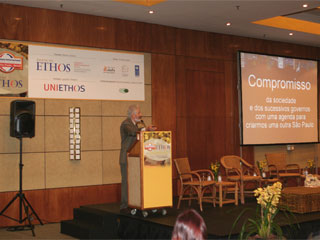Our São Paulo Movement proposes home cleaning
Successful ideas and practices can set an example for other cities
Transforming São Paulo in an equitable and sustainable city is the mission of the Nossa São Paulo: Outra Cidade (Our São Paulo: Another City) movement, presented in the theme panel “Challenges for the construction of sustainable cities”. In order to achieve this objective, several segments of society, in partnership with public and private institutions, are mobilized and committed to developing and fulfilling an agenda and a set of goals. The idea shall serve as an example for other cities and result in a Conference on Sustainable Cities in 2008.
“São Paulo is the matrix of an unsustainable model from the last century”, defined Eduardo Jorge, São Paulo City Environment Secretary. In his opinion, the city will only become sustainable when this theme moves from theory to collective action. “Everyone is responsible for the change. The burden must be shared according to each one’s shoulder. Regardless of social class, responsibilities must be fulfilled.”
Oded Grajew, chairman of the Board of Instituto Ethos de Empresas e Responsabilidade Social, asserted that good government is critical for the construction of sustainable societies. “For this project to work out, the next administrations must integrate these initiatives and, together, everyone must do something to provide quality of life for all the population.”
Inspired by the experience undertaken by the civil society in Bogota, Colombia, the Nossa São Paulo: Outra Cidade movement, according to Grajew, has no political party linkage and is interreligious. It gathers many leaderships, but has neither a president nor a board. The Colombian example shows that, when there is good will from the public power and the population, it is possible to change the cities’ reality. Carlos Córdoba, coordinator of the Project Bogota Cómo Vamos, showed that one area that improved with the initiative was public finance: “For the past 15 years, 42% of the population has not paid taxes and, in 2006, 96% started paying them”. This shows that the population’s trust has increased, leading some city residents to, voluntarily, decide to pay 10% above the amount due. This extra public finance income was used in education, health, and infrastructure.
Another aspect that changed was violence: in the 1990s, homicide rate in Bogota was 80 per 100 thousand inhabitants. In 2006, this figure dropped to 18 per 100 thousand. Córdoba says the citizens are more aware, discussing what has been done as a result of publicity in the media. “This project teaches that political culture is something too serious to be left exclusively in the hands of politicians. Results haven’t come out of miracles, but from a different attitude, because what is made collectively remains collective”, said Córdoba.
Eduardo Jorge explained that in a city like São Paulo, so full of contrasts, it is not easy to develop sustainability projects. However, it is possible to find ways to increase the funds available to the departments. “In Brazil, there are very few cities with an environment department. Altogether, the country has one thousand departments that address the issue, with funds under 1% of the municipal budget”, he said. Despite the lack of resources and structure, Jorge explains that São Paulo has been working in several areas. One of them is air quality, with a scheduled inspection of the fleet of 5.5 million vehicles for the control of carbon monoxide emissions. A project aimed at improving water quality intends to clean 40 streams and, in landfills, all the recyclable debris from civil construction shall be used for paving the streets.
Nossa São Paulo: Outra Cidade welcomes the participation of organizations and companies, and can set an example for other cities. “Instituto Ethos’ mission is to help every city, through partnerships, to develop its own sustainability project that will bring better quality of life to all the population. It is a daring and unique project that will only work if each one does his or her share”, asserted Oded Grajew. There are already over 300 institutions from São Paulo city participating in it, and we plan to make a database available to all political parties so they can make use of the good ideas in the next electoral campaigns.
Fonte: Instituto Ethos

> Petrobras Watch the Petrobras coverage
© Copyright 2007, Instituto Ethos de Responsabilidade Social Empresarial. Todos os direitos reservados






